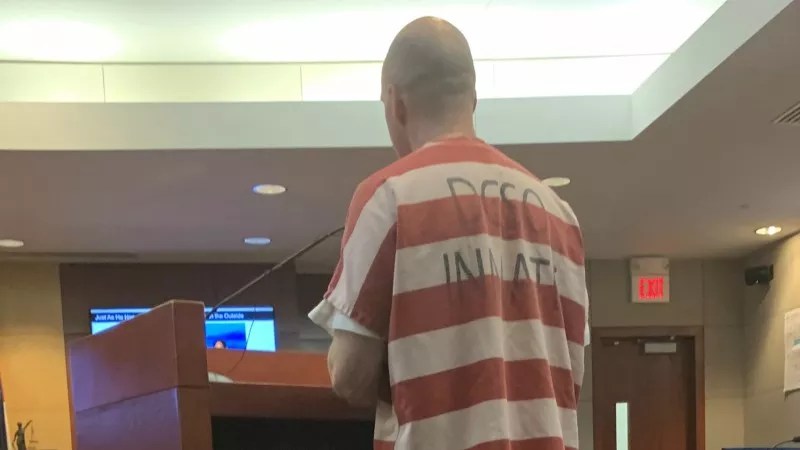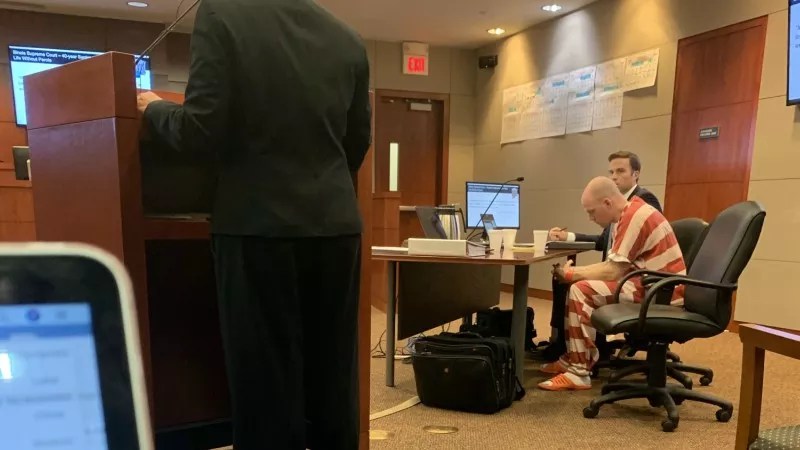
Jessica Peck

Audio By Carbonatix
At a hearing yesterday, May 22, in Douglas County court, Erik Jensen’s sentence for failing to intervene in a 1998 murder at age seventeen was changed from life without parole to being parole-eligible after forty years. As such, he’s currently scheduled to remain incarcerated for many more years than the actual killer, who’s likely to be released next year – something that prompted excuses from the judge in the case, who claimed that state law essentially prevented her from doing anything different.
“It went as expected,” notes attorney Jessica Peck, who’s acting as a spokesperson for Jensen’s parents, Curt and Pat, “with some tears from Erik and multiple witnesses.”
The emotion is understandable given the facts of the case, which revolves around Nathan Ybanez, who was just sixteen when he used a fireplace tool to kill his mother, Julie. Ybanez has long admitted that Jensen, his close friend at the time, played no role in the crime, though Jensen didn’t intervene and helped clean up the scene afterward.
Governor John Hickenlooper commuted Ybanez’s sentence in late 2018, shortly before leaving office, making him eligible for parole next year, in part because his parents had physically and sexually abused him prior to the brutal attack. However, he took no such action for Jensen.
The resentencing hearing was mandated by Colorado legislation passed in the wake of Miller v. Alabama, a 2012 U.S. Supreme Court decision in which the plaintiffs argued that “the Eighth Amendment forbids a sentencing scheme that mandates life in prison without possibility of parole for juvenile homicide offenders.” A majority of the justices agreed, calling for individualized sentencing by judges in capital cases involving juveniles.
But rather than individually reconsidering the sentences of fifty inmates, including Jensen, who’d been sentenced to life without parole for wrongs done as juveniles since the early 1990s, Colorado lawmakers created a system in which offenders found guilty of first-degree murder as a juvenile would be eligible for parole after forty years, with so-called earned time (i.e., time off for good behavior) potentially lowering the jolt to thirty years.

Pat and Curt Jensen at the hearing.
Jessica Peck
This scenario set up the likelihood of a bitter irony, as Curt explained to us for a post published yesterday. “To me, that’s the most unbelievable of all the things that have happened in the last 21 years,” he said, “and certainly the hardest for us to accept. Here’s Nathan, who’s said Erik didn’t do it, that he wasn’t responsible, that he wasn’t in the deal. And yet Nathan is going to be free and Erik could still be in prison.”
Any hope that Douglas County Judge Theresa Slade would ignore the resentencing guidelines given the unique circumstances of Jensen’s case were slender. “The judge indicated in advance of the hearing that forty-to-life was her only option,” Peck points out via email. “She gave him forty-to-life, and provided a brief narrative about the disconnection between Erik’s character and achievements behind bars and her inability to consider these in the sentencing process.”
Prior to this action, Peck recounts, “a few men previously sentenced under old JLWOP [juvenile life without parole] talked about how unfair it is that Erik has gotten no relief and they’re walking around free.”
In addition, she goes on, “Erik testified and did a great job. He said prison is a very tough place to be and there are many days when he questions how he will survive the day. His motivation to get out of bed is the knowledge that he can be a powerful force for good, and ultimately save lives inside a prison rife with hopelessness.”
His parents have done everything they can to support this approach. Their son is housed in the Limon Correctional Facility, and as Peck divulges, “Every Sunday, the Jensens get in their car and make the long trek to visit Erik in person. Staff has informed them that they hold the record for highest number of visits for any inmate there.”
Their dedication is unusual, Peck continues. “After the first year of any LWOP sentence, it’s widely believed that – but for 10 to 20 percent of such inmates – all others can expect zero regular visits or contact from family or friends.”
In her opinion, “The Jensens’ love for their son is truly inspirational. Erik has been in prison for two decades. Their only absences from Sunday visits have been the result of impossible weather conditions or cancellation of all inmates’ visitors, implemented by the prison as discipline on some broader matter.”

Erik Jensen listens to a speaker at the hearing.
Jessica Peck
As for next steps, Peck, who’s working with attorney Lisa Polansky, who represents Jensen, offers the following list:
1. Lisa Polansky and Erik’s other lawyers will challenge the constitutionality on the forty-to-life mandate.
2. Together with Lisa’s co-counsel, I’ll get rolling on efforts to get Erik clemency from [Governor Jared] Polis. I emailed his deputy counsel post-hearing and we are planning a call between lawyers and Polis’s team. I’ve personally asked if Polis will take a meeting with the Jensens. I asked previously, but he told me it was premature until the court had completed re-sentencing. I’m cautiously optimistic that he could be our savior here.
3. As a broader matter, Colorado’s sentencing statutes, including but not limited to those specific to forty-to-life in JLWOP cases and/or those provoking mass ongoing confusion over calculation of “good time,” are ripe for examination and revision. The environment is better moving forward well in advance of the 2020 legislative session for multiple reasons. The legislature has an opportunity, together with Polis, to preempt the courts to resolve Erik’s specific issues once and for all. On behalf of the Jensens and together with them, I hope to do whatever I can to facilitate a legislative strategy that, at best, is currently in its infancy. Curt has been talking with the AG [Attorney General] throughout the year and, like all legislative advocacy, we’d seek substantial stakeholder perspective as well.
There’s also the matter of 18th Judicial District DA George Brauchler, under whose jurisdiction the Jensen matter falls. He declined comment to Westword about the case prior to the hearing, and Peck expresses frustration about his inaction to date.
“I’ll never understand George Brauchler,” she writes. “Offering a suitable plea here is an easy win in any pitch to claim he’s compassionate to young offenders and supports rehabilitation efforts.” She adds that “he had a deputy DA there and did not appear in person. The DDA said very little, as the parties stipulated in advance as to the joint request – by default – for forty-to-life.”
Right now, the website for the Pendulum Foundation, an organization started by Curt and Pat Jensen after Erik’s arrest to change juvenile laws, is offline – so Peck encourages folks to keep up by visiting Jensen’s Facebook page, maintained by his sister. She stresses that the family is committed to working until Jensen walks free. As she puts it, “They’ve never given up.”